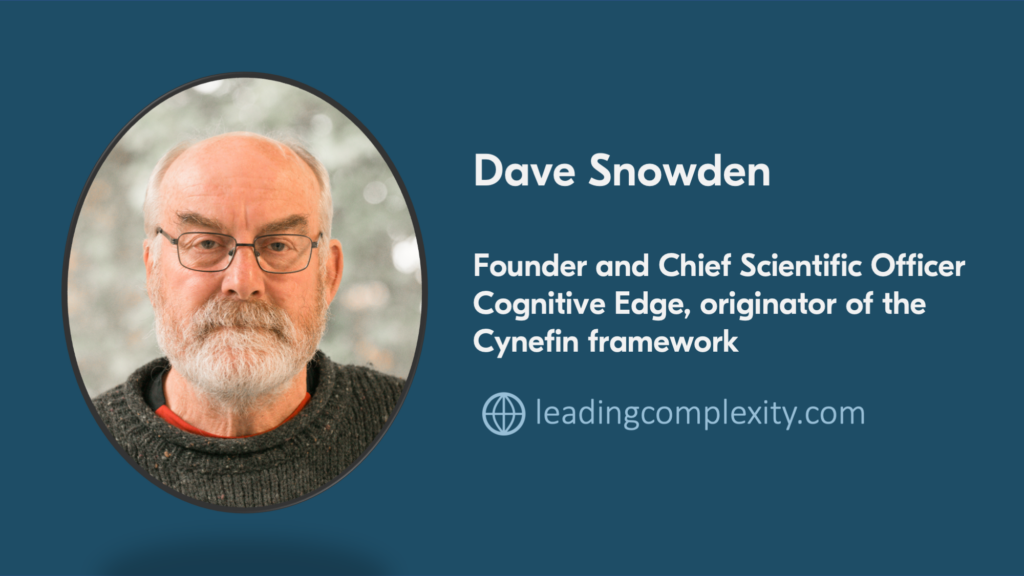Dave Snowden, a prominent speaker, delivered a captivating presentation during the 2022 edition of the Leading Complexity program. Here, we present a concise summary of his insightful discourse. To witness his exceptional performance firsthand, we encourage you to participate in this year’s program, granting you access to a wealth of videos from the remarkable 2022 event.

Leadership today is all about challenges and complex paths. And this week’s keynote speaker has a very unique approach to the matter.
Without further ado, here are the five key insights by Dave Snowden for leading complexity.
1. The Challenges of Leadership in a Complex World
Dave has been in the field for a long time and has worked with huge corporations such as IBM. Due to his impressive background, he really understands what it means to be a leader. In other words, he really understands the challenges that come with leadership in a complex world.
The discussion starts right away, with Dave talking about the problem of thinking that you can define certain leadership qualities as the leadership qualities needed are always context specific.
He explains that being a cynical person actually helps.
“The cynics are the ones in the organization who care. You should listen to them because they’ll […] say things that nobody else wants to say, and you need to hear them.”
Furthermore, he clarifies that being a leader often involves making difficult decisions. And that may not lead to universal admiration.
“I used to explain to leaders: if you want to be loved and liked, don’t be a manager. It doesn’t go with the territory.”
Dave emphasizes that effective leadership involves multiple developing processes in a complex environment. He says that the aim of these processes is to generate the qualities we want rather than trying to impose them.
Basically, he points out that effective leadership is not about artificially demanding something from the people you work with. On the contrary, effective leadership is about allowing people to make their own choices.
2. Embracing a Distributed Decision-Making Approach
The next part of the keynote clarifies that charisma-driven leadership is not a sustainable solution. Not for scaling businesses anyway.
“If we want to scale something, we can’t just be relied on the odd leader who makes something happen through charisma.”
Instead, Dave mentions an approach called ‘distributed decision-making.’ He talks about how this effective leadership component is important in complex environments.
Dave suggests that organizations should prioritize distributed decision-making and cognitive diversity. Furthermore, he advocates for delegating decisions to small groups rather than individuals. He calls these groups ‘entangled trios.’ This means bringing together people from different backgrounds to solve complex problems.
“So what we’re doing is creating a complex ecosystem of interactions in which the qualities […] emerge.”
Simply put, he explains how new ideas can be born by leveraging the cognitive diversity of these entangled trios. And how that allows for more transparency and helps avoid the formation of “tribes.” This is a way of leveraging cognitive biases rather than trying to overcome them.
3. Leveraging Micro-feedback for Driving Change in Large Organizations
The discussion about the importance of trios continues as Dave emphasizes the need for introducing micro-feedback. He explains that this way of working allows the leader to set the flow in the desired direction. Yet, it enables individuals to make their own choices.
“What we’re doing there is introducing micro-feedback. So that people can make their own choices. Yet we’re still partially triggering the move.”
So yes, micro-feedback is a powerful tool as it empowers individuals and helps avoid resistance to change. Thus, using trios in large organizations can help drive change and promote innovation.
4. Prioritizing Incremental Changes and Navigating Through Uncertainty
Moving on, Dave suggests that organizations should prioritize high-impact yet low-energy solutions. That, plus continuously monitoring progress, can help them achieve sustainable, resilient change. Furthermore, doing so, while working in small groups can create a culture where new people fit in and have a chance to stand out.
And that is another critical component of successful leadership.
“The key thing in complexity is you start journeys with a sense of direction; you don’t try and achieve goals.”
Rather than starting with an idealistic future state, companies should begin their journeys with a sense of direction. Moreover, they should embrace the system’s complexity to navigate uncertainty.
5. Embracing Failure to Foster a Culture of Innovation
Last but not least, Dave puts out a very powerful idea. In order to foster a culture of innovation within an organization, we need to create an environment where it is safe to fail.
“You have to be willing to accept that some things won’t work out, and that’s okay.”
This means that failure should not be viewed as a negative outcome but rather as an opportunity for growth and learning.
He advocates for creating an ecosystem of interactions within an organization. An ecosystem where small, unintended consequences can lead to improvements over time. Dave discusses how organizations should not rely on a single program or initiative. Rather than that, they should focus on generating multiple micro-projects that can succeed or fail. And as he mentions, this approach allows organizations to learn from their failures and adapt over time.
“We’re creating processes which generate the qualities we want rather than trying to decide what those qualities are and try to train an emergent property, which you actually can’t do.”
Therefore, organizations can foster innovation and drive continuous improvement. And that can be done by embracing failure and creating a culture of experimentation and learning.
In conclusion, failure is a necessary component of personal and professional progress. As a last thought, we want to leave you with one last compelling quote extracted from this enlightening keynote:
“Do something based on the way human beings have evolved to make decisions rather than some weird enlightenment concept of rationality.”



